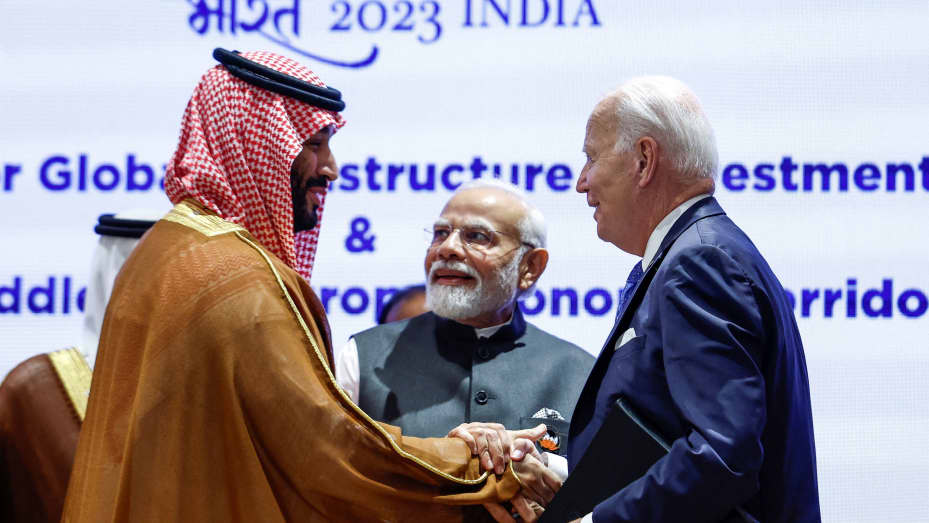
Saudi Arabia announces crucial step forward in its nuclear power plans
WHIA-CNBC
- “The kingdom is committed through its policy on atomic energy to the highest standards of transparency and reliability,” Saudi Arabia’s energy minister said during the IAEA’s annual conference in Vienna, Austria.
- Switching to a broader inspection regime will enable the kingdom to access fissile material and start running its small nuclear reactor.
- The developments come amid increasing concern among nuclear nonproliferation experts and lawmakers about Saudi Arabia’s intentions with the technology, and the potential for a Middle Eastern arms race.
Saudi Arabia announced its commitment to building a nuclear energy program, as well as a pledge to allow greater oversight for atomic energy inspectors, at a time when the kingdom is pushing ahead with its drive to become a more powerful player on the international stage.
The Saudi energy minister said his country would move to much more robust safeguards and checks from the International Atomic Energy Agency, the U.N.’s nuclear watchdog, than it had previously. Under the agency’s Small Quantities Protocol (SQP), the IAEA exempts countries with little or no nuclear material from many inspections and transparency requirements.
“The kingdom has recently taken the decision to rescind its Small Quantities Protocol and to move to the implementation of a full-scope Comprehensive Safeguards Agreement,” Saudi Energy Minister Prince Abdulaziz bin Salman Al Saud said during the annual conference of the IAEA in Vienna on Monday.
“The kingdom is committed through its policy on atomic energy to the highest standards of transparency and reliability,” he said.
The watchdog agency had been pushing the kingdom and other countries with SQPs to switch to the Comprehensive Safeguards Agreement (CSA) for years – IAEA Director General Rafael Grossi called them a “weakness” amid global non-proliferation efforts.
In a post on social media platform X, Grossi wrote: “We signed an agreement for #SaudiArabia to provide the @IAEAorg with junior professional officers, marking a significant step in nuclear expertise and cooperation,” and thanked the kingdom for its support.
The announcement put the spotlight on the kingdom’s nascent nuclear energy efforts — Saudi Arabia has a small nuclear reactor, a research unit set up with the help of Argentina, that it has not yet put into operation. Moving to the CSA will enable the kingdom to access fissile material and start running the reactor, which would make it the second Arab country in the world with a nuclear energy program after the United Arab Emirates.
“I look forward to receiving Saud Arabia’s formal communication about its decision,” Grossi said late Monday. “The IAEA stands ready to provide support in this regard.”
The Saudi energy minister did not comment on whether his country would also join the IAEA’s Additional Protocol, which requires more thorough oversight including snap inspections.
Concerns of a Middle East arms race
Prince Abdulaziz’s comments come amid increasing concern among nuclear nonproliferation experts and lawmakers about Saudi Arabia’s intentions with the technology. Saudi Crown Prince Mohammed bin Salman said in a recent wide-ranging interview with Fox News that if Iran developed nuclear weapons, Saudi Arabia would too. He initially made the same assertion in an interview with CBS in 2018.
The kingdom under Mohammed bin Salman’s leadership has made strides in elevating its position as a global player, from hosting the G20 and mediating between Russia and Ukraine to investing billions of dollars in global sports deals and major events. It has flexed its muscle as a so-called “middle power,” establishing itself as a diplomatic actor able to leverage its relationships with both the West and Russia and China for its own benefit. A nuclear program would elevate that position further.

Riyadh is also trying to obtain as many concessions as possible from Washington as the Biden administration tries to push it toward a normalization deal with Israel. U.S. assistance with a nuclear energy program is one of Saudi Arabia’s key demands — but not everyone is happy about that.
“A normalization agreement with Saudi Arabia would be a welcome development. But not at the cost of allowing the Saudis to develop nuclear weapons. Not at the cost of a nuclear arms race throughout the Middle East,” Israeli opposition leader Yair Lapid said in a statement last week. Numerous U.S. and European lawmakers have also voiced objections and concerns.
The development also comes against the backdrop of continued gridlock in talks between Washington and Tehran, the latter of which has been rapidly increasing its uranium enrichment levels in the years since former President Donald Trump pulled the U.S. out of the Iranian nuclear deal in 2018. The multilateral Obama-era deal had allowed the lifting of economic sanctions on Iran in exchange for curbs to its nuclear program.
The IAEA in early September announced that there was “no progress” in the IAEA’s efforts to monitor Iran’s nuclear activity, and that “verification and monitoring has been seriously affected by Iran’s decision to stop implementing its nuclear-related commitments under the JCPOA,” the acronym for the Iran deal, which is formally called the Joint Comprehensive Plan of Action.
Iran maintains that its program is solely for civilian purposes, but it has increased its uranium enrichment to 60% purity – just a short technical step away from 90% purity, which is the level needed for bomb-making capability. Iranian President Ebrahim Raisi said the changes came after European signatories to the JCPOA “trampled upon their commitments” in the deal.
Still, the U.N. watchdog said that Iran’s enriched uranium stockpile was down this month compared to May, potentially in a nod to the U.S. But it remained 18 times higher than its limit under the JCPOA.
CNBC has contacted the Iranian foreign ministry for comment.
